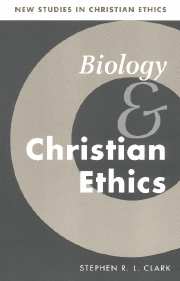Book contents
- Frontmatter
- Contents
- General editor's preface
- Preface
- Introduction
- 1 The development of Darwinian theory
- 2 Moral and metaphysical assumptions
- 3 Trying to live in nature
- 4 The biology of sin
- 5 Human identities
- 6 The goals of goodness
- 7 The end of humanity
- 8 The covenant with all living creatures
- 9 Conclusion: cosmos and beyond
- Index
7 - The end of humanity
Published online by Cambridge University Press: 02 December 2009
- Frontmatter
- Contents
- General editor's preface
- Preface
- Introduction
- 1 The development of Darwinian theory
- 2 Moral and metaphysical assumptions
- 3 Trying to live in nature
- 4 The biology of sin
- 5 Human identities
- 6 The goals of goodness
- 7 The end of humanity
- 8 The covenant with all living creatures
- 9 Conclusion: cosmos and beyond
- Index
Summary
THE PLEASURE PRINCIPLE
By older standards, we are all hedonists. The only respectable reason for any act is the pleasure that it brings, or the suffering it avoids. Even those who take account of pains and pleasures that are not their own do so because they are pleased by others' pleasures, and sympathetically pained by others' pains. Even those who take some pleasure in the thought of leaving the world a ‘better place’ intend no more than that the world will have more pleasure for less pain. Our welfare, or the welfare of the world, is measured in the pleasures and the pains we can count. It does not follow that we are all ‘utilitarians’. Utilitarians believe, or hope to believe, that there are ‘best outcomes overall’, or even one best outcome. They may disagree as to whether the value of those outcomes rests upon the total net enjoyment of life, or on the average or median enjoyment. Is a smaller ‘happier’ human population better than a larger ‘happy’ one? They may be more or less ruthless in their calculations: few professed utilitarians in fact consider whether it might be right (for example) to breed pretty imbeciles for pederasts or babies for gourmet restaurants, or to have everyone ‘put down’ before they achieve the last, seventh, age of man. Being decent folk, professed utilitarians will usually, if challenged, think of some specious reason why those programmes would not achieve ‘best outcomes’, while similar programmes (which they happen to approve of) would.
- Type
- Chapter
- Information
- Biology and Christian Ethics , pp. 258 - 282Publisher: Cambridge University PressPrint publication year: 2000



